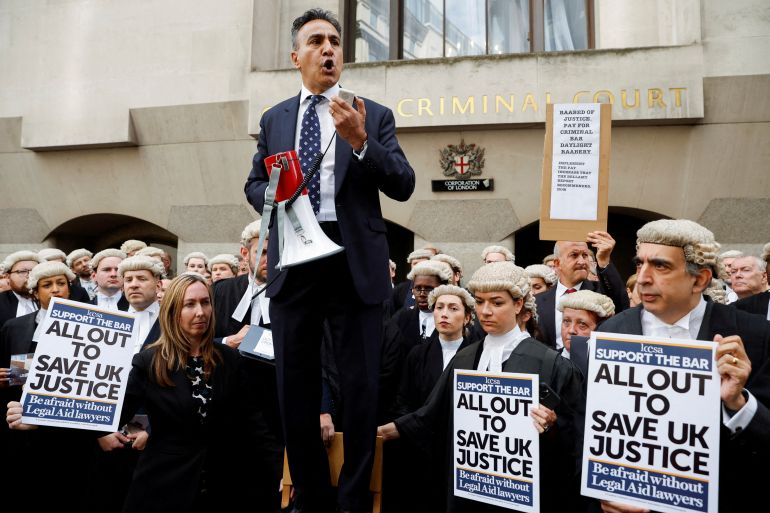Criminal barristers in England, Wales to go on strike
An all-out strike action will start next month in a row with the UK government over jobs and pay.

Criminal barristers in England and Wales have voted in favour of an all-out strike next month in a row with the UK government over jobs and pay.
Members of the Criminal Bar Association (CBA) have been walking out on alternate weeks but were balloted on whether to escalate the industrial action with an indefinite, uninterrupted strike that would start on September 5.
Keep reading
list of 2 itemsTens of thousands of UK workers strike as inflation crushes wages
The ballot closed at midnight (23:00 GMT) on Sunday and the result was announced on Monday morning.
CBA vice chairwoman Kirsty Brimelow QC said this is the “last-resort action” over the demand for less money than it costs the government for the courts to sit empty.
“The effect [of the strike] will be that the courts continue to sit empty with trials and cases not being heard. It is a last-resort action,” she told BBC Breakfast.
“The remedy is for an injection of money into the backlog of cases, which currently stands at 60,000 cases, that barristers are working on that will cost the government only 1.1 million pounds [$1.29m] per month. Currently, it’s costing much more for the courts to sit empty.”
According to Ministry of Justice (MoJ) figures, more than 6,000 court hearings have been disrupted as a result of the dispute over conditions and government-set fees for legal aid advocacy work.
Data released under freedom of information laws show that during the first 19 days of industrial action – between June 27 and August 5 – there were 6,235 court cases disrupted, including 1,415 trials, across England and Wales.
Fee rise
Criminal barristers are due to receive a 15 percent fee rise from the end of September, meaning they will earn 7,000 pounds ($8,260) more per year.
But there has been anger that the proposed pay rise will not be made effective immediately and will only apply to new cases, not those already sitting in the backlog waiting to be dealt with by courts.
“This is an irresponsible decision that will only see more victims face further delays and distress,” said Justice Minister Sarah Dines.
“The escalation of strike action is wholly unjustified considering we are increasing criminal barristers’ fees by 15 percent, which will see the typical barrister earn around 7,000 pounds more a year.”
The MoJ previously said it had “repeatedly explained” to the CBA that backdating pay would require a “fundamental change” in how fees are paid.
“That reform would cost a disproportionate amount of taxpayers’ money and would take longer to implement, meaning barristers would have to wait longer for payment,” it added.